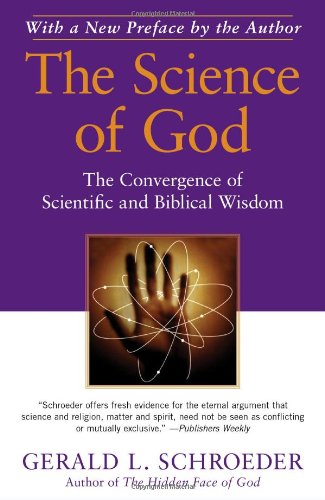Book review: The Science of God
by Gerald L. Schroeder
★★★
This book has sold a lot of copies and generated a lot of discussion since its publication in 1997, but it really just didn’t do it for me. Schroeder’s premise is that Bible thumpers and secular scientists need to put their heads together, compromise a little here and there, and realize that the Bible story goes hand-in-hand with 20th-century scientific discovery.
That means the seven-day creation story is true (Einstein’s theory of relativity helped us out a little on this topic) by measuring time from God’s perspective. The cosmic clock of Genesis is based on the characteristics of cosmic background radiation. The dinosaurs were created on day five, a day that lasted roughly a half billion years. The flood really happened when the Bible says it did, but it wasn’t a universal event. Before the flood, people lived extraordinarily long lives, because the climate was less demanding. You get the idea.
I agree with Schroeder that the conditions of our universe and our own little world are incredibly fine-tuned, and thus a bit difficult to explain. Schroeder quotes Weinberg’s famous calculation that if the energy of the big bang fifteen billion years ago were different by one part out of 10 to the 120th power, there would be no life anywhere in the universe. It’s as if the universe is tuned for life from its inception. There have been a number of thought-provoking responses to Weinberg’s conclusion, but it’s still difficult for me to put out of my mind the idea that something really special has happened for our benefit … something quite carefully planned.
It’s a puzzle without easy explanation, alright. I just don’t get why anyone would choose the Bible’s myths as the foundation for their explanation. As carefully as Schroeder has put his theory together, it still just feels contrived and overly complex to me. If Schroeder wants believers and scientists to hold hands and sing Kum Ba Yah, he’s going to need to write down to the non-scientist level. But why bother? Don’t the earliest Bible stories make a whole lot more sense as theological or political or moral treatises than as history books? Why not let religion be religion and science be science?












 354 Circles
354 Circles
 603 Goodreads Friends & Fans
603 Goodreads Friends & Fans

 Hello! I'm an author, historical Jesus scholar, book reviewer, and liberal Christian, which means I appreciate and attempt to exercise the humanitarian teachings of Jesus without getting hung up on any particular supernatural or religious beliefs.
The Bible is a magnificent book that has inspired and spiritually fed generations for thousands of years, and each new century seems to bring a deeper understanding of life’s purpose. This is true of not only Christianity; through the years, our age-old religions are slowly transforming from superstitious rituals into humanitarian philosophies. In short, we are growing up, and I am thrilled to be riding the wave.
I avidly read all thought-provoking religion titles. New authors: I'd love to read and review your book!
Hello! I'm an author, historical Jesus scholar, book reviewer, and liberal Christian, which means I appreciate and attempt to exercise the humanitarian teachings of Jesus without getting hung up on any particular supernatural or religious beliefs.
The Bible is a magnificent book that has inspired and spiritually fed generations for thousands of years, and each new century seems to bring a deeper understanding of life’s purpose. This is true of not only Christianity; through the years, our age-old religions are slowly transforming from superstitious rituals into humanitarian philosophies. In short, we are growing up, and I am thrilled to be riding the wave.
I avidly read all thought-provoking religion titles. New authors: I'd love to read and review your book!
 Hi! While Lee writes the articles and reviews the books, I edit, organize, and maintain the blog. The views expressed here are Lee's but I'm his biggest supporter! :-)
Hi! While Lee writes the articles and reviews the books, I edit, organize, and maintain the blog. The views expressed here are Lee's but I'm his biggest supporter! :-)
Connect With Me!